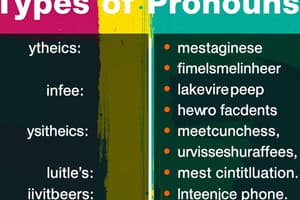Podcast
Questions and Answers
Quali parole grammaticali sostituiscono i nomi in una frase?
Quali parole grammaticali sostituiscono i nomi in una frase?
- Preposizioni
- Articoli
- Pronomi (correct)
- Verbi
Quali pronomi possono funzionare come soggetto o oggetto di un verbo?
Quali pronomi possono funzionare come soggetto o oggetto di un verbo?
- Pronomi (correct)
- Avverbi
- Articoli
- Aggettivi
A quale tipo di pronomi appartengono 'io', 'noi', e 'ci'?
A quale tipo di pronomi appartengono 'io', 'noi', e 'ci'?
- Pronomi relativi
- Pronomi possesivi
- Pronomi personali (correct)
- Pronomi dimostrativi
Quale tipo di pronomi sono 'questo', 'quel' e 'quelli'?
Quale tipo di pronomi sono 'questo', 'quel' e 'quelli'?
Quale tipo di pronomi indicano possesso o appartenenza?
Quale tipo di pronomi indicano possesso o appartenenza?
Chi o che cosa riferiscono i pronomi 'egli', 'esso', e 'loro'?
Chi o che cosa riferiscono i pronomi 'egli', 'esso', e 'loro'?
Quali parole sono corrette come pronomi possessivi singulari?
Quali parole sono corrette come pronomi possessivi singulari?
Quali pronomi riflessivi/aggettivi intensivi sono corretti per indicare il plurale?
Quali pronomi riflessivi/aggettivi intensivi sono corretti per indicare il plurale?
Perché è importante che i pronomi concordino in genere e numero con i sostantivi che sostituiscono?
Perché è importante che i pronomi concordino in genere e numero con i sostantivi che sostituiscono?
Quale di questi pronomi viene utilizzato per enfatizzare il soggetto o l'oggetto di una frase per una singola persona?
Quale di questi pronomi viene utilizzato per enfatizzare il soggetto o l'oggetto di una frase per una singola persona?
Qual è uno dei modi in cui i pronomi possono creare un tono più colloquiale nella scrittura?
Qual è uno dei modi in cui i pronomi possono creare un tono più colloquiale nella scrittura?
Per cosa sono utili i pronomi secondo il testo?
Per cosa sono utili i pronomi secondo il testo?
Flashcards are hidden until you start studying
Study Notes
Pronouns
Pronouns are words that take the place of nouns in a sentence. They help to avoid repetition and can function as the subject or object of a verb. Pronouns can be categorized into different types, including personal pronouns, demonstrative pronouns, and possessive pronouns.
Personal Pronouns
Personal pronouns refer to the person using the pronoun, as well as other people. They can be further divided into first-person, second-person, and third-person pronouns:
- First-person pronouns (e.g., I, me, myself, we, us, ourselves): These pronouns refer to the person using the pronoun or the person or people being addressed directly.
- Second-person pronouns (e.g., you, your): These pronouns refer to the person or people being addressed directly.
- Third-person pronouns (e.g., he, she, it, they, them): These pronouns refer to someone or something other than the person using the pronoun.
Demonstrative Pronouns
Demonstrative pronouns are used to point out or identify specific people, things, or ideas. They include words like this, that, these, and those:
- Singular demonstrative pronouns (e.g., this, that): These pronouns are used to refer to one thing or person.
- Plural demonstrative pronouns (e.g., these, those): These pronouns are used to refer to more than one thing or person.
Possessive Pronouns
Possessive pronouns indicate possession or ownership. They include words like mine, yours, his, hers, its, and ours:
- Singular possessive pronouns (e.g., mine, yours, his, hers, its): These pronouns are used to indicate possession of a single item.
- Plural possessive pronouns (e.g., ours, yours, theirs): These pronouns are used to indicate possession of more than one item.
Intensive/Reflexive Pronouns
Intensive/reflexive pronouns are used to emphasize the subject or object of a sentence. They include words like myself, yourself, herself, himself, and ourselves:
- Singular intensive/reflexive pronouns (e.g., myself, yourself, herself, himself): These pronouns are used to emphasize the subject or object of a sentence for a single person.
- Plural intensive/reflexive pronouns (e.g., ourselves): These pronouns are used to emphasize the subject or object of a sentence for more than one person.
Usage Tips
When using pronouns, it's essential to ensure they agree in number and gender with the nouns they replace. For example, if the noun is singular, the pronoun should also be singular, and if the noun is plural, the pronoun should also be plural. Additionally, subjective and objective pronouns should be used correctly in the context of the sentence.
In writing, pronouns can be used to create a more conversational tone, as they can be more inclusive and avoid gender-specific language. For example, using "they" instead of "he" or "she" can help to be more inclusive in writing.
Conclusion
Pronouns are a crucial aspect of English grammar, helping to avoid repetition and indicate possession or ownership. Understanding the different types of pronouns and their usage can help improve your writing and communication skills.
Studying That Suits You
Use AI to generate personalized quizzes and flashcards to suit your learning preferences.




